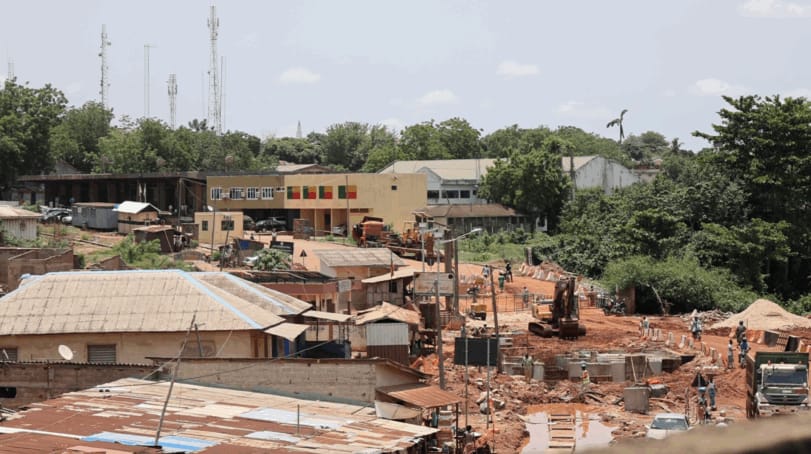At the buzzing frontier town of Idiroko, located in Ipokia Local Government Area of Ogun State, commerce flows with an intensity that mirrors the unyielding spirit of the women who drive it. Positioned strategically along Nigeria’s border with the Benin Republic, Idiroko has transformed from a modest village into a vital economic hub—its lifeblood sustained by cross-border trade and the resilience of its women.
Despite regulatory hurdles and economic downturns, especially during the COVID-19 pandemic and subsequent border closures, these women have not only adapted but have found innovative ways to support their families, contribute to the local economy, and anchor the prosperity of their communities. Cross-border trade within Africa has gained renewed momentum through strategic frameworks established by ECOWAS, AfCFTA, and the African Union.
SPONSOR AD
Regional Trade Frameworks: Enabling Cross-Border Commerce
ECOWAS, with its Trade Liberalization Scheme and Common External Tariff, has laid the groundwork for seamless regional trade in West Africa. These initiatives aim to reduce tariffs and non-tariff barriers, promoting the free movement of goods, services, and people across borders. This regional effort is further amplified by AfCFTA’s continent-wide ambition to create a unified market, enhancing intra-African trade, industrialization, and economic diversification. The African Union plays a critical coordinating role, aligning regional economic communities like ECOWAS under its broader Agenda 2063 vision for integration and prosperity.
By supporting infrastructure development, policy harmonization, and digital trade facilitation, the AU ensures that cross-border trade becomes a powerful catalyst for inclusive growth across Africa. Together, these institutions are reshaping Africa’s trade landscape, fostering deeper economic ties and unlocking new opportunities across the continent. This has enabled thousands of traders, especially women, to engage in commerce beyond national boundaries, from Tunbé market in Nigeria to Igolo in Cotonou, Benin Republic.
The Women Traders of Idiroko and Igolo: Stories of Resilience

The true story of Idiroko’s economic engine isn’t found in policy documents or trade statistics, but in the lived experiences of women traders who form the backbone of cross-border commerce. Modinat Bakare, a trader who began with selling beans and bread, now runs a successful fabric business that spans multiple countries. “Now people know my name across the border,” Bakare noted, “I now trade in Cotonou, Togo, and Ghana. This business has taken me far.” She arranges vibrant Ankara fabrics outside her shop in Tunbé market.
At 65, her frail hands move with practiced mastery, each fold telling a story of decades spent in this trade. The border town always has an early wake, busy roads filled with motorcycles dodging between buyers and sellers, carrying goods to destinations near and far, and the distant call of traders echoing through the air. The Igolo women in money exchange show women’s commitment to trade across borders, extending to Igolo, a Beninese town 132.7 kilometers from the Idiroko community, where women are leveraging this opportunity to run businesses, raise families, and support local development.
Economic Impact and Contributions of Women Traders
This border town in Ogun State represents more than just a geographical boundary between Nigeria and the Benin Republic. For generations, it has presented women in this community with the opportunity to master cross-border trade, build financial independence, and contribute to economic growth. Here, in a sector typically dominated by men across West Africa, these women have carved out unique financial power as operators of bureau de change businesses.

Ganiyat Adegbola seated at her stall in Igolo
These “money women” facilitate the currency transactions that oil the wheels of cross-border trade. Igolo women like Ganiyat Adegbola and Toyin Kukoyi exemplify how women-led enterprises contribute significantly to economic survival. While Ganiyat continues to thrive in currency exchange, Toyin, who sells sachet water, is already exploring export opportunities into Nigeria to expand her business. “In Igolo, many of us women are Bureau De Change operators. Our businesses support not just us but our extended families,” Ganiyat said. “Before a man earns five thousand, a woman would have made fifteen.” Amid these economic challenges, communal thrift groups have become lifelines. Muinah Adeosun, a herbal drink seller, survives through daily contributions that support her business and family. “Yesterday, I paid ₦14,000. Today it’s ₦18,000. That’s how I survive,” she explained.

Toyin Kukoyi hawking sachet water across the border
Post-COVID Recovery and AfCFTA Opportunities
With the post-COVID reopening of borders and Nigeria’s ratification of the African Continental Free Trade Area (AfCFTA), there’s a new wave of hope. AfCFTA has introduced policies aimed at reducing trade barriers, enhancing customs cooperation, and supporting infrastructure development in border areas. In the wake of the post-reopening economic recovery, experts and policymakers are emphasizing the importance of strengthening local markets and cross-border trade, particularly in border communities like Idiroko.
A renewed focus on economic integration under the AfCFTA is offering practical strategies for local businesses to thrive amid evolving trade dynamics. Dr. Aliyu Ilias, a renowned expert in economic policy, has urged local markets to adapt to the new economic realities by embracing innovation, improving logistics, and leveraging digital platforms. According to him, with the reopening of trade routes and increased regional cooperation, local businesses must position themselves to meet growing intra-African demand while maintaining competitiveness.

Transborder activities in Igolo
In alignment with these insights, the AfCFTA has reiterated its commitment to deepening cross-border trade and supporting local economies. He noted that several initiatives are in place to simplify trade procedures, improve infrastructure, and promote economic inclusivity. “The promotion of cross-border trade involves trade facilitation that enhances customs cooperation, the simplification and harmonization of customs procedures, automation of customs operations, and the creation of a single window to enhance compliance, reduce clearance time and cost.
Others include border agency cooperation, simplification of processes and procedures to reduce the cost of compliance, the removal of non-tariff barriers (NTBs), the provision of trade-related infrastructure such as storage (warehouses and cold rooms) and roads, adoption of border markets as export and import hubs, capacity building and training for local businesses, support the adoption of the Pan African Payment and Settlement System (PAPSS) to reduce or eliminate the cost of currency conversion, information sharing, support for adoption of digital trade, and market access support for SMEs.
Implementing the AfCFTA Agreement to realise these aspirations will enhance the movement of goods, services, capital and people across the continent to the aspirations of Agenda 2063 for a continental market with the free movement of persons, capital, goods and services, which are considered as critical to economic integration that will lead to the structural economic transformation of the African continent to one with increased production capacity and capable of acquiring a significant share of global trade.”

Speaking of the aspirations of the AfCFTA, Mr. Olusegun said it aligns with and reflects Agenda 2063 of the African Union, which is a strategic framework whose objective is to deliver inclusive and sustainable development for the continent, “Realizing this involves, among others, deepening economic integration, which is what the AfCFTA seeks to achieve by creating a single market and increasing intra-Africa trade. Economic integration through the AFCTA is anticipated to boost industrialization by building regional value chains and supporting backward integration as manufacturers scale up production.
Furthermore, he said, “Implementing the AfCFTA Agreement to realize these aspirations will enhance the movement of goods, services, capital and people across the continent to the aspirations of agenda 2063 for a continental market with the Free Movement of persons, capital, goods and services, which are considered as critical to economic integration that will lead to the structural economic transformation of the African continent to one with increased production capacity and capable of acquiring a significant share of global trade”.
The Informal Economy and Women’s Empowerment

A Trade Expert, Amah Yemi, shares insights into the significant contributions women make to the informal economy in their efforts to sustain their livelihoods. ‘’In the area of poverty and alleviation, you see the grassroots woman does not wait for you to give her a grant of 100 million or any financial assistance, these women have the capacity of turning over whatever little they have to provide for their family and community.
They are meeting needs, and don’t be surprised, most of them are breadwinners of their families, it’s a role that has been overlooked but is very crucial.”
Conclusion
Empowering women engaged in informal cross-border trade, as demonstrated by the traders in Idiroko and Igolo, is not merely a matter of social equity but a significant driver of inclusive economic growth, enhanced regional integration within frameworks like ECOWAS and AfCFTA, and sustainable development across the African continent.
Their resilience, adaptability, and economic contributions, often in the face of regulatory hurdles and economic shocks, highlight their pivotal role in local economies and their potential to further contribute to Africa’s economic transformation with targeted support and the full implementation of progressive trade policies.
DISCLAIMER: This content is produced as part of the Move Africa project, commissioned by the African Union Commission and supported by the Deutsche Gesellschaft für Internationale Zusammenarbeit (GIZ) GmbH. The views and opinions expressed are those of the authors only and do not necessarily reflect those of the GIZ or the African Union.
Do you want to share a story with us? Do you want to advertise with us? Do you need publicity for a product, service, or event? Contact us on WhatsApp +2348183319097 Email: platformtimes@gmail.com
We are committed to impactful investigative journalism for human interest and social justice. Your donation will help us tell more stories. Kindly donate any amount HERE






